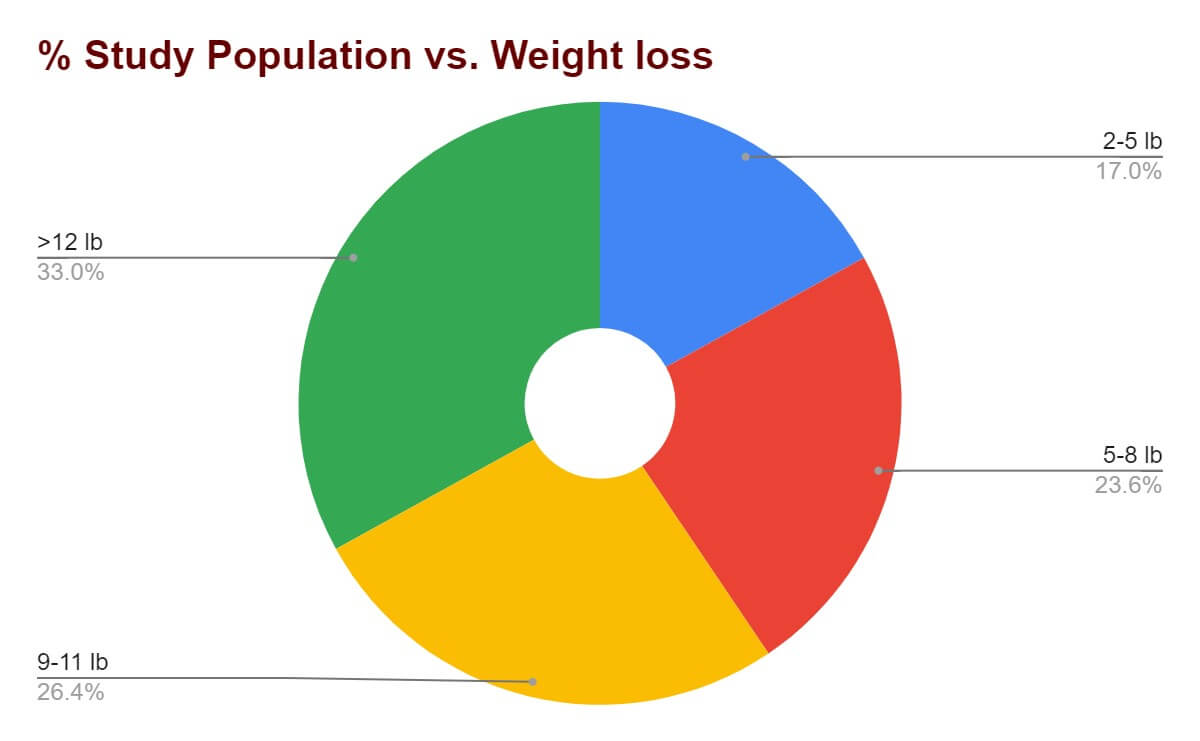Intermittent fasting has become a popular weight-loss method in recent years. This diet involves alternating between periods of extreme calorie reduction and normal eating. Proponents of intermittent fasting claim that it can help with weight loss and reduce the risks of inflammation and heart disease.
The most popular intermittent fasting method is the 5:2 diet, which involves eating normally five days a week and reducing calorie intake to 500-600 calories on the two fasting days. Another method consists in alternating “fast” days, where a quarter or less of a person’s calorie requirement is consumed, with “feast” days.
The pie graph below shows the result of the study. It can be seen that 33% of the people involved in the study lost more than 12 lbs of their weight.

However, research on intermittent fasting is relatively new and limited. One study published in JAMA Internal Medicine found that both the traditional calorie cutters and the intermittent fasters lost weight after 12 months. However, there was a high dropout rate among those assigned to the fasting regimen, suggesting that fasting may not be a sustainable weight-loss strategy for everyone.
Another pitfall of intermittent fasting is the risk of overeating on non-fasting days. When people are deprived of food, appetite hormones and hunger centres in the brain go into overdrive, making them more prone to indulging in unhealthy dietary habits.
Despite these potential pitfalls, some people may find intermittent fasting psychologically beneficial. It may also activate cellular mechanisms that boost immune function and reduce inflammation associated with chronic disease. However, no substantial evidence exists that fasting offers additional health benefits beyond traditional weight-loss methods.
Before trying intermittent fasting, it is essential to consult with a doctor, particularly if you have diabetes or take medication for blood pressure or heart disease. A strong social support network is also crucial to help you endure very low-calorie days over the long term. While intermittent fasting may work for some people, it is not a one-size-fits-all solution for weight loss and improved health.
The Harvard Health Publishing article suggests intermittent fasting may have potential benefits, but more research is needed to understand its effects on weight loss and overall health. In addition, while it may benefit some people, it is not a sustainable weight-loss strategy for everyone. Therefore, discussing with a healthcare provider before trying intermittent fasting is important, especially if you have any underlying medical conditions.


Alright, so I stumbled upon biabettelegram. Seems like a useful Telegram channel. If you’re into mention relevant topics based on assumption, e.g., sports betting tips, give it a look! biabettelegram
69vn15? Not immediately familiar, but always up for trying something new. Hopefully they have some decent sign-up bonuses. Link is below: 69vn15
Been messing around on 888p1com, and I’m kinda hooked on one of their slots games. The payouts haven’t been bad either! Might be fun to check out the selection: 888p1com
Hey guys, just wanted to say KU19NET is my new go-to! Seriously, the games are popping and the wins feel oh-so-good. Give ku19net a try, you won’t regret it!
Yo, 9apisoph is alright. Nothing too flashy, but it gets the job done if you’re looking for something to kill some time. Don’t go betting the farm though, alright? See for yourself: 9apisoph
So, I downloaded the 9apisoapp. It’s okay, does what it says on the tin. Honestly, hundreds of apps like these out there. But hey, give it a whirl if you’re curious. Download it here: 9apisoapp
Yo, 666casino, I’ve been playin’ here for a bit. It’s alright, nothin’ crazy special, but consistently good. Solid choice if you’re lookin’ for a trusted site. 666casino